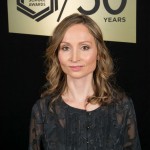 Find more about Dana Lund @
Find more about Dana Lund @
Offical website
Soundcloud
IMDB
Brief list of credits
The Dark Horse
Tell us a little about yourself and what you do for a living.
I am from originally from Canada, but currently reside in New Zealand. I am a film and television composer and teach music/piano.
What is your niche or speciality that makes you stand out from the rest of the audio professionals?
I am very proficient on the piano as I began taking classical piano lessons from the young age of 6. My piano is definitely my starting point for all of my compositional ideas. I think all composers benefit by being accomplished on at least one instrument.
Can you give us a brief summary of the equipment you use regularly?
I regularly use my Yamaha upright piano, cello, Casio digital piano and my iMac computer. I have also recently bought an electric viola, which I am experimenting with. I use Logic Pro as my DAW.
What are your go-to plug-ins and software? (virtual instruments, audio processing etc.)
For the film, The Dark Horse, I frequently used an audio unit plug-in called Michael Norris’ Soundmagic Spectral (free download). This plug-in allowed me to create some interesting drone sounds for the film. The samplers I use are the EXS24 Sampler and Kontakt. For my virtual piano sounds I like to use Pianoteq and 8dio’s Steinway 1928 grand piano.
When do you find you are most creative?
Sometimes in the evenings I get a spurt of energy and creativity but the best way to get my creative juices flowing is when I am working on a specific project that I am passionate about. It’s very easy to get into the zone when you are excited about a project.
What is your usual process for creating audio content for games, films, etc?
When going through thee creative process I like to be given examples of other pieces that evoke the mood that the director is aiming for. I find this to be very helpful in sending me in the right direction.
Are there any particular secrets to your creativity?
I definitely believe that creativity has a genetic aspect to it, but I do think it is something you can fuel. Finding different things that inspire me always helps my creativity, for example, watching other films that have music that I love or even just playing inspiring music on the piano help guide me.
Do you have any audio creation techniques that resulted in something interesting?
Adding filters (effect plug-in) to my cello audio recordings created some interesting sounds. For example, some of the filters changed the timbre from a string sound to a wind instrument sound. I also discovered some great glass sounds by recording myself tap on a variety of glass bottles with a metal knife and then sampling these.
Any specific “lessons learned” on a project that you could share?
Ensure that the recording quality that you are working with from the get-go is of a very high standard because you never know when you might capture a magical performance/recording even if you think you are only experimenting. That first performance/recording could have a spirit to it that is hard to recreate later.
Any tips, hints or motivational speeches for the readers?
I think that taking care of yourself is pretty important. You want to feel refreshed and energetic when working on a project. It becomes a lot more of a chore or obstacle if you are feeling under the weather. Staying healthy and being excited about life is probably when I feel my most creative and would imagine others would agree.
